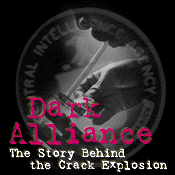The
Function of the Drug War
by J. Orlin Grabbe
 The function of the Drug War is to create the Drug Crisis. The Drug Crisis
involves billions of dollars of hidden cash flow. Addicted to this flow of
money are law enforcement agencies, drug producers and distributors, covert
agencies who use it as a source of black funding, and politicians and
bankers who are hired to protect the drug revenues. Addiction to drug
revenues requires that the drug war be fought so as to be lost.
The function of the Drug War is to create the Drug Crisis. The Drug Crisis
involves billions of dollars of hidden cash flow. Addicted to this flow of
money are law enforcement agencies, drug producers and distributors, covert
agencies who use it as a source of black funding, and politicians and
bankers who are hired to protect the drug revenues. Addiction to drug
revenues requires that the drug war be fought so as to be lost.
Failure thus becomes the criterion of success. Many state agencies, and federal agencies such as US Customs, the Drug Enforcement Administration, the Department of Justice, and the U.S. Treasury, reward themselves for fighting the Drug War by claiming a portion of the loot seized—helping themselves to cash, bank deposits, securities, boats, automobiles, houses, land, on-going businesses, as well as the readily-marketable drugs themselves.
The Drug Warriors' financial focus ("follow the money") requires them to devote their energy in the direction it will be most rewarded—to look for juicy targets flush with success. Such juicy targets consist of those who have created flourishing drug enterprises in the midst of the Drug War.
These successful drug enterprises make up the necessary list of worthwhile targets leading to successful busts. Big drug busts involving heretofore lucrative drug businesses are announced in a blaze of publicity—emphasizing the amount of money and drugs seized, and people arrested. Only the failure of the Drug War and the continuing success of drug enterprises can sustain the continuing stream of assets ripe for seizure (off-budget funding) and the beneficial media publicity, such as lurid TV footage of stacks of plastic-wrapped money and cocaine.
Thus the failure of the Drug War
becomes the measure of the Drug Warriors' success, and the ineffectiveness
of the Drug Warriors becomes the continuing justification for their
existence. The Drug Warriors are ever justified by the continuing Drug
Crisis and the richness of the Drug Warriors' targets. Hence the Drug
Warriors must fight the Drug War ever harder in order to ensure that it will
be successfully lost.
Producers and distributors of illegal drugs require the Drug War in order to
eliminate competition and maintain profit margins. Without the Drug War, a
slew of small farmers would take over the growth of marijuana crops and
would eventually drive pot prices down to the marginal cost of production.
The giant methamphetamine kitchens in Mexico require the Drug-War-inspired
monitoring of chemicals to prevent competition from the once pervasive
amateur labs in American homes. Cocaine producers and distributors require
enforcer watchdogs such as the Drug Enforcement Administration to keep out
new lower- cost entrants to the market.
General Manuel Noriega received an award from the DEA for his cooperation in the Drug War. Noriega served the Medellin cartel and kept out Cali competitors by turning them in to the DEA. The DEA was happy, Noriega was happy, and the Medellin cartel was happy. By cooperatively fighting the Drug War, the Drug Warriors and Drug Suppliers ensured the continuing flow of money and drugs through Panama. But whenever competition increases, the Drug War must be fought ever more vigilantly to ensure the continuing success of its failure.
Only if competition is controlled
can the market price of illicit drugs be kept well above their marginal cost
of production, thus ensuring the massive profits upon which Drug Suppliers
and Drug Warriors depend.
Covert agencies are increasingly tasked with supplying intelligence on the
illegal drug trade, such as in the US where drugs have been designated a
national security problem. The best vantage point from which to gather
intelligence on the illegal drug market is to be in the illegal drug
business. Thus covert agencies must deal drugs in order to assist the War on
Drugs. Moreover, being covert requires covert monies for financing, and the
most obvious source of "black market" funding is drug money. Drug money is
obtained by supplying services to the drug trade. Here in Costa Rica the CIA
provides air transport to "the brothers" who run a lucrative trade in
illicit substances.
In other locations other agencies
are similarly involved. The NSA, through the NPO (National Programs Office),
provided secure storage for cocaine in its network of secure warehouses
across the US. In another country, the DIA operates a drug manufacturing
facility. Similar statements can be made about the British, French, and
Israeli intelligence services. The Drug War provides black market funding
for the covert agencies, and justifies the need for them to provide
intelligence to fight the Drug War. The Drug War must be fought harder to
ensure the requisite funds and intelligence to fight the Drug War.
The Drug War provides a political rationale for the continuing production
and sale of military equipment and consulting services in the absence of
obvious enemies. Just recently the US sold Guatemala a sophisticated
electronic fence to protect its border. Similar sales have been made to
other countries. References to drug traffickers and smugglers form as much a
part of the political justification for these expenditures as do references
to the threat of invasion. In the case of Guatemala, what the US did not
tell the local military was that it is now a matter of US national security
policy to only install fences with holes in them.
The electronic holes are intended to ensure that US bombers can reach their destinations unimpeded by surveillance. When someone informed the Guatemalan military of this fact, they angrily demanded of the US to know if this were true. Yes, there are holes, the US admitted; but the US also claimed that no one would be able to find them, because of the ultra-sophisticated top secret technology involved. It was a lie. A consultant showed the Guatemalans the location of the holes using only a few hundred dollars of off-the-shelf electronic equipment. There were 12 holes, each roughly a quarter mile wide, providing an air corridor open from the ground to the heavens. The location of such holes is usually sold to drug couriers in a matter of a few weeks.
Thus the drugs continue to flow
through the fences unimpeded, helpfully keeping alive the original rationale
for military involvement in the Drug War. (In the case of Guatemala, the
same drugs might show up at the Guatemalan airport, where security is
provided by Wackenhut. Wackenhut is a private security firm supplying
security services to top- secret US military and nuclear facilities. In some
of these facilities, computer hard drives containing nuclear secrets may
appear and disappear behind copying machines much like drug planes may
appear and disappear on either side of electronic fences with well- designed
security holes.)
Drug propaganda supplies an essential ingredient in the Drug War. We see an
endless parade of TV shows in which
photogenic actors and actresses protect the young and innocent from the big
bad drug dealers, along with just-say-no campaigns of mindless emotionalism.
A cigarette looks silly in your ear; it looks sillier in your mouth. Don't
think, just be embarrassed and believe.
Here are pictures of crack babies; aren't they revolting? The cooperation of the news media in government propaganda creates a pervasive background of Pavlovian conditioning which can be stirred up to a hysterical boil whenever the Drug War is threatened, or when it needs to be reinvigorated. The public will then "demand something be done", and the hired politicians will smoothly respond with the needed legislation.
Take George W. Bush and Al Gore,
for example. Whichever man is elected, he will call for a new effort to
sustain
the Drug War's vigor, whether it be called "Reinventing the Drug War" or the
"Drug War with Compassion", or something entirely different. Because, like
other hired politicians, the new President will know the Drug War must be
fought harder to keep the money and drugs flowing, and everyone happy. Only
in failure will there be success.
J. Orlin Grabbe is the author of International Financial Markets and resides in Costa Rica. From The Laissez Faire City Times, Vol. 4, No 37, September 11, 2000
